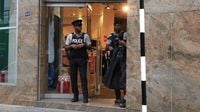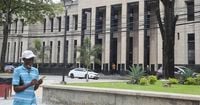Trinidad and Tobago declared a state of emergency on Friday, July 18, 2025, marking the second such declaration in less than a year amid escalating concerns over organized crime syndicates operating both inside and outside the prison system. This move follows intelligence reports revealing a coordinated criminal network plotting assassinations, kidnappings, and robberies targeting senior government officials and national institutions.
Police Commissioner Allister Guevarro, who recently began his tenure just a month ago, disclosed at a press conference that the intelligence surfaced on Thursday, July 17, 2025, prompting urgent consultations with the National Security Council, Prime Minister Kamla Persad-Bissessar, and Attorney General John Jeremie. President Christine Kangaloo signed the proclamation that same night, authorizing enhanced police powers to confront the threat.
Guevarro described the situation as a matter of "grave concern," emphasizing the formation of an "organized crime syndicate" comprising gang members both inside prisons and on the outside. The syndicate has been linked to a spate of kidnappings and homicides, which law enforcement has traced back to their orchestrated activities. "When I received this information, it was most troubling to me," Guevarro stated. "As your Commissioner of Police, I cannot, in good conscience, stand before you, knowing what I know, and not take definitive action." He further clarified that this declaration is not politically motivated, contrasting it with a previous state of emergency under former Prime Minister Dr. Keith Rowley.
One of the critical challenges highlighted by the police is the unauthorized trafficking of cellular devices into prisons, facilitated by compromised personnel. These illicit phones have enabled encrypted, real-time communication between incarcerated gang leaders and their external associates, allowing them to coordinate criminal operations effectively. To disrupt this, Guevarro personally supervised the relocation of key gang leaders from the Maximum Security Prison at Golden Grove to a more secure, undisclosed facility. "We do not want to make these people famous," he said, refusing to disclose the exact number of inmates moved but assuring that their communication channels have been severed.
Despite the severity of the threat, the government has not imposed a curfew. However, under the new state of emergency, police officers have been granted expanded powers, including the authority to enter homes and conduct searches without warrants. Guevarro cautioned law enforcement against abusing these powers, stressing that only criminals should fear the measures. "The only people who need to be concerned are the criminals. This SOE and the emergency powers are specifically targeted at them. Law-abiding citizens have no reason to fear," he asserted.
The Trinidad and Tobago Police Service (TTPS) released a statement urging citizens to remain calm, cooperate with authorities, and report any suspicious activities. The statement detailed that the criminal syndicate is actively mobilizing resources to orchestrate targeted attacks against senior officials and institutions, with funding derived from violent crimes such as high-value robberies, armed home invasions, extortion, kidnapping, and even infiltration of state-funded contracts and programs. The scale and coordination of these activities reportedly exceed the capacity of conventional law enforcement, necessitating this comprehensive and immediate strategic response.
Trinidad and Tobago, a twin-island nation with a population of approximately 1.5 million, has grappled with rising homicides and gang violence for over a decade. In 2024, the country recorded 624 killings, its deadliest year on record. However, media reports from May 2025 indicated a 33% decrease in homicides compared to the same period in 2024 and 2023. Despite this, Attorney General John Jeremie acknowledged a resurgence in gang-related homicides and kidnappings, underscoring the ongoing security challenges.
Former police commissioner Gary Griffith criticized the latest state of emergency declaration, calling it "ridiculous" and suggesting that better prison management could have averted the crisis. He cited instances where phones were seized multiple times within 24 hours from inmates due to corrupt prison officers facilitating their smuggling. "There was a situation where there was a major criminal element in the Port of Spain prison, and three times in 24 hours, we seized a phone from that individual. As soon as we seized the phone, he got another one – because of prison officers on the take," Griffith explained.
The legal framework for the state of emergency allows the President to declare it initially for one month, which can be extended by the House of Representatives in three-month increments up to a maximum of six months. Further extensions require approval from both Houses of Parliament with a three-fifths majority vote, with each extension not exceeding three months. The current declaration mirrors the one announced in December 2024 and extended in January 2025, both aimed at curbing gang violence.
Since taking office, Commissioner Guevarro's officers have removed more than 30 firearms from the streets and brought numerous individuals before the courts. He expressed commitment to rewarding officers for their efforts in combating crime. Guevarro emphasized that this state of emergency is a proactive measure rather than a reactive one, aimed at safeguarding national stability and protecting public officials and institutions from the growing threat posed by organized crime.
As the government mobilizes to dismantle this syndicate, citizens are urged to stay vigilant and cooperate with law enforcement. The absence of a curfew reflects an attempt to balance security concerns with civil liberties, but the expanded police powers underscore the seriousness of the threat. The coming weeks will be critical in determining whether these measures can effectively disrupt the criminal networks and restore a sense of safety across Trinidad and Tobago.


